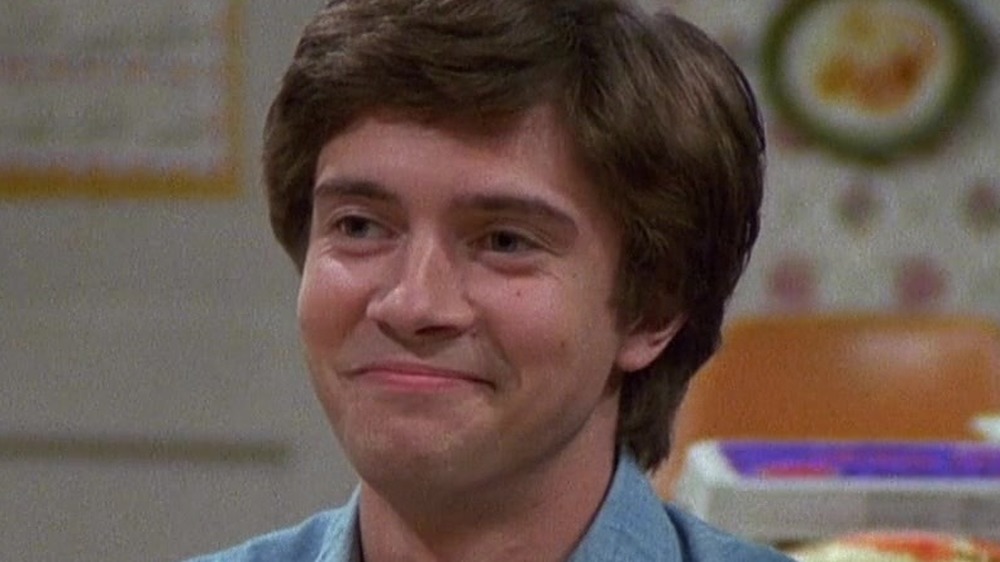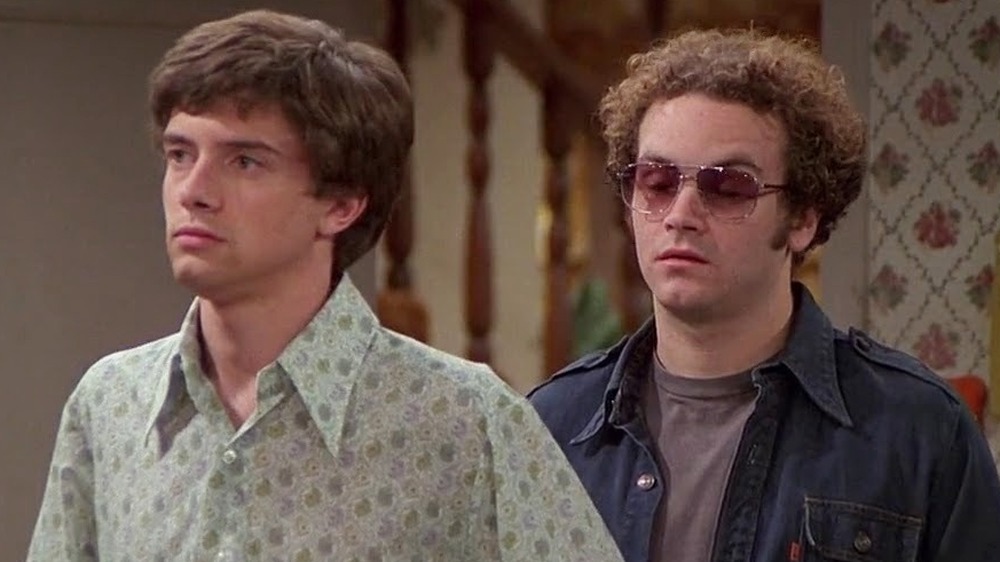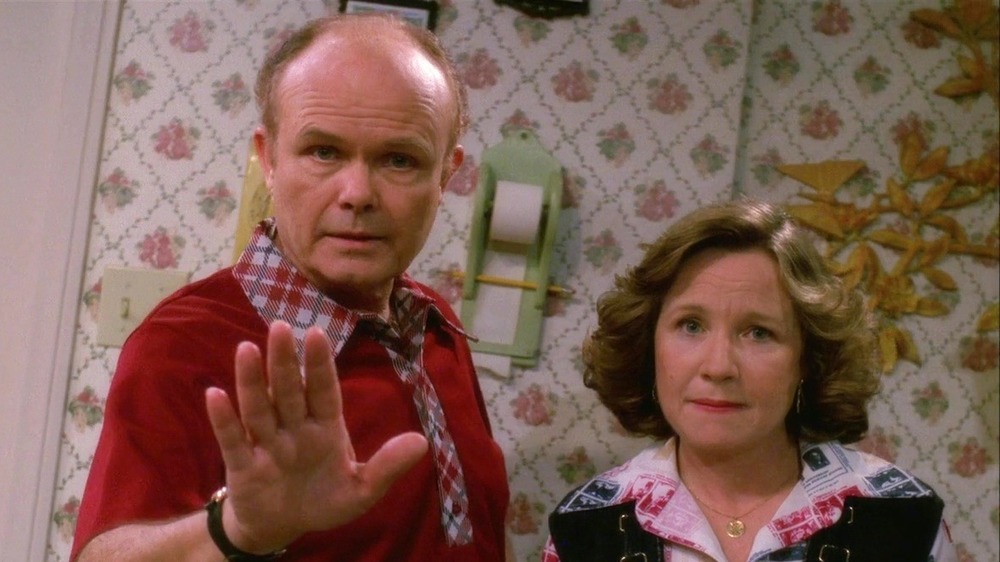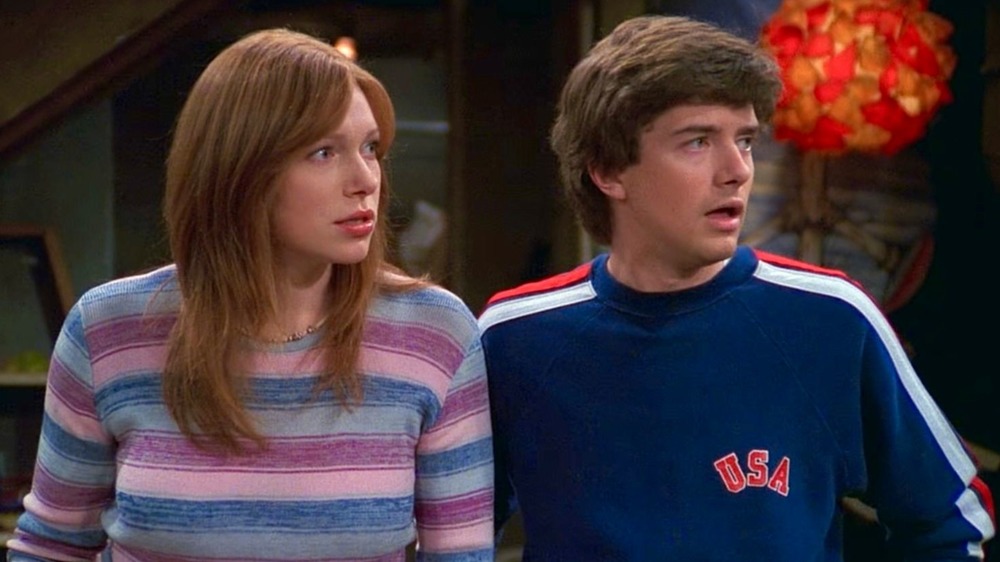Why Eric From That '70s Show Was The Absolute Worst
The gang from the classic Fox sitcom That '70s Show were such a lovable bunch that it's easy to overlook some of their more ... shall we say, not-so-endearing qualities. Indeed, more often than not, those foibles were played for laughs, perhaps even when they shouldn't have been. For instance, Michael Kelso (Ashton Kutcher), the most charming idiot there ever was, never saw a skirt he didn't want to chase, even when he was in a committed relationship with Jackie Burkhart (Mila Kunis). Speaking of Jackie, her endless self-absorption often kept her from being there for friends in need. Then there's Donna Pinciotti (Laura Prepon), whose confidence and self-assuredness could sometimes edge right on into arrogance and stubbornness, and Steven Hyde (Danny Masterson) whose cynicism and self-professed lack of empathy could act as a smokescreen to help keep him emotionally distant from his friends.
Sometimes it seemed that it was only with Fez (Wilmer Valderrama), the creepy foreign exchange student with a heart of gold, that what you saw was what you got. And when it came to Eric Forman (Topher Grace), the nerdy, witty nucleus around which the group of friends revolved ... well, he could be the worst of the bunch, when it came to masking his true feelings, ignoring what was right in front of his nose, and putting his considerations above those of anyone else. Grace's portrayal made Eric easy to love, but That '70s Show's writers did an excellent job of fully sketching him out to be every bit a typical American teenager — which is to say that sometimes, he could just be the absolute worst.
Eric Forman could be a pretty crappy friend
While it was never less than obvious that Eric cherished his friendships with the entire group (with the possible exception of Jackie, whom he pretty much couldn't stand), he could often fall pretty significantly short in the friendship department. For example, Eric and his main squeeze Donna spend the entirety of season 4 broken up, which of course drives a wedge between all of the friends. Donna initially tries to maintain the status quo by continuing to be friendly with Eric — but he kicks her out of their hangout in his parents' basement, which effectively forces everyone else to choose between them. He then engages in an episode-long round of one-upsmanship with Donna in an attempt to win them over, a petty, manipulative response that finally ends in a reluctant truce between the two.
Eric's biggest failure as a friend, though, came in the season 2 episode "Eric's Stash." In it, Eric finds that his secret stash of cash (which he hides in a Candy Land board game) is missing when he goes to retrieve it to buy Donna an anniversary present. His suspicion falls squarely on Hyde, who is living in the Forman home after having been effectively abandoned by both his parents. Hyde strenuously (and angrily) maintains his innocence, and indeed, it turns out that it was Eric's father Red (Kurtwood Smith) who had "borrowed" the cash to pay for a home repair. Sure, Eric's accusation was largely due to the fact that Hyde had tried to kiss Donna once, which was a slimy move — one that Hyde had repeatedly atoned for, and which had happened quite some time prior. To his credit, Eric apologized profusely to Hyde, but he never should've suspected his friend in the first place.
Eric Forman didn't give his parents the easiest time
Speaking of Red, he could totally be a hardass, and Eric's mother Kitty (Debra Jo Rupp) could often be a bit clueless when it came to what was going on with her son. But Red and Kitty were, at the end of the day, caring and involved parents. And Eric, perhaps even more so than the average teenager, could give them a pretty hard time. For one thing, he never seemed to be able to resist antagonizing either parent with his "smart mouth," as Red often referred to it, even when they were obviously not in the mood — but most troubling was his tendency to keep secrets from Red and Kitty, even major ones.
The most glaring example of this: Eric's engagement to Donna, which he manages to keep a secret from his parents for seven episodes and change. Even the rest of the gang thinks that getting married is a terrible idea, and Eric's insistence that he and Donna are mature enough to make such a monumental decision doesn't exactly square with the fact that he's too intimidated to tell his parents. In fact, he only blurts out the truth to Red after his father one-ups him in the wit department.
Eric Forman was also terrible boyfriend
Eric had the capacity to be something of a cad to his friends and parents, but when it came to Donna, the love of his life, he could be an outright jerk. He was a consistent, shameless mansplainer, despite the fact that he, more than anyone, was aware of Donna's keen intelligence. He took it personally when Donna — who, gasp, is a girl — beat him at basketball. He did his level best to make her jealous when she failed to sufficiently flip out over another girl's interest in him. And that breakup? It happened because Donna was uncomfortable wearing a promise ring, which Eric made clear constituted a promise that they'd be "together forever."
Any 17-year old in their right mind would be leery of such commitments, but even when the pair finally did get engaged, it was Eric who failed to follow through. The pair's impending wedding was a focal point of the entire sixth season, and in its penultimate episode, Eric disappears before the wedding rehearsal — and remains missing for an entire day, only phoning the Forman house once to let everyone know he's okay, and then speaking only to Hyde. (Hyde even asks if he wants to talk to Donna, and Eric apparently refuses.)
Indeed, Eric seems to have a series-long penchant for looking gift horses right in the mouth, and it takes a months-long trip to Africa (thanks to Grace's departure from the show for its final season, and return for a cameo in the finale) for him to seemingly mature enough to finally appreciate his great parents, loyal friends, and attractive, patient girlfriend. We like to think that in the eighties, he was — in the show's parlance — a bit less of a dill-hole.



